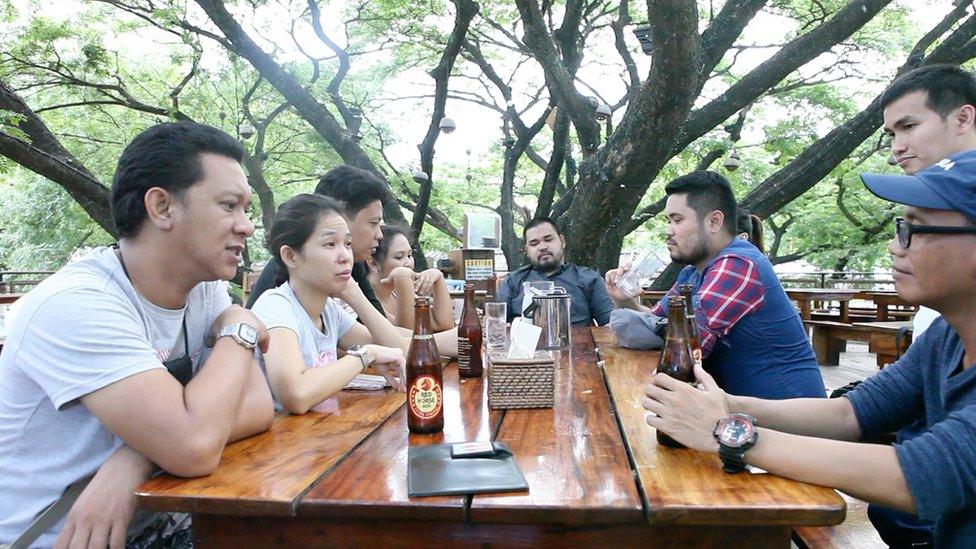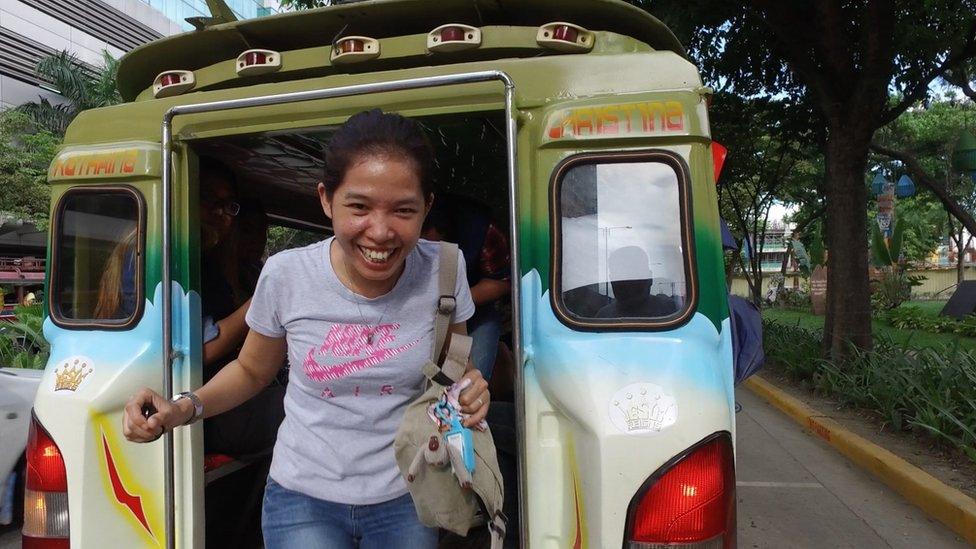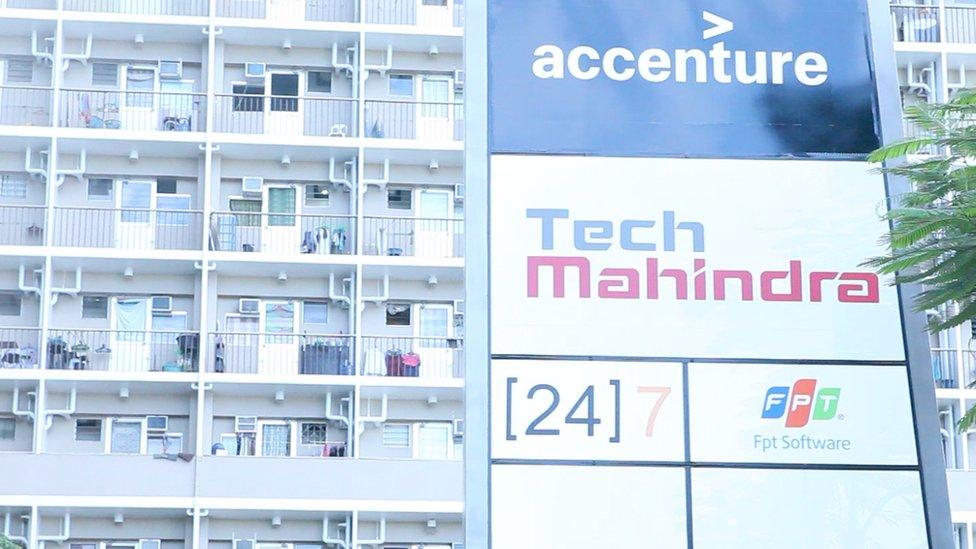Philippines outsourcing: 'Customers want people, not robots'
- Published

Outsourcing is offering more work options to Filipinos
In a Manila call centre, Sarah Prestoza spends hours helping exasperated callers on the other side of the world troubleshoot problems with their internet connections.
Almost all of them are in a bad mood; some are rude, others are racist.
A few "difficult callers" can't even explain what they want, which is a problem when your boss won't let you hang up on them.
But most are just frustrated and want a little help.
"Especially the older people. They would like to have patient people who could help them," Ms Prestoza says.
Grunt work
The Philippines sits at the heart of the "business process outsourcing" industry. And that is not just call centres.

Sarah Prestoza says many of her customers tell her "I'm glad I was not talking to a robot"
It includes much of the repetitive white collar grunt work that American companies think is too expensive to do domestically, things like data processing, software development, medical transcription and animation services.
Success relies on the strong customer service ethic of people like Ms Prestoza, as well as good English skills.
And never more so than now, as it navigates the twin threats of artificial intelligence and protectionism in the US, from where most of these jobs were outsourced.
Workers here often start their shifts late at night to line up with US time zones.
Getting robbed on the way to work is a genuine risk, they say. Shift work kills social lives and has negative health effects.
And customers often feel entitled to take out their frustrations. In fact, many suggest that only Filipinos have the patience for this type of work, which is why US companies are here.
Pay factor
But despite getting abuse from a stranger twelve time zones away, many are remarkably upbeat about their jobs.
By local standards, they're well paid. A surprising number have degrees in other disciplines, but work in call centres because the money is better.
Entry level salaries are comparatively good and they don't need to join the millions of Filipinos who have moved abroad in search of bigger pay cheques.
By 2022. the sector will employ about 1.8 million people, with about half a million of them working outside Manila, predicts the Information Technology and Business Process Association of the Philippines (IBPAP).
The sector helped keep jobs growth alive through the global financial crisis and looks likely to overtake foreign remittances as the country's biggest revenue generator. Not bad for an industry that didn't exist 20 years ago.
'Growing'
Although most of these jobs have been outsourced from the US, the industry says it isn't too worried about a wave of protectionism.
The Trump administration, for all its "America First" rhetoric, has not enacted any legislation that would have an impact, says IBPAP.
It is harder to slap a duty on a service than on a good that physically needs to enter the country, the organisation points out.
And US trade policy seems to be more focused on manufacturing, anyway.
"So far, I haven't really encountered a reduction or a contraction. A number of these companies are growing and continue to grow," said Rey Untal, IBPAP's president.

Hannah De Anas may lose her job after Verizon favoured the US for some of its call centre work
But one company, Verizon, just created a thousand new jobs at its US call centres, at the expense of a contract with an operation in the Philippine province of Cebu. Although some of the 1,500 workers will be moved onto other contracts, many expect to lose their jobs.
Verizon has made no suggestion that the move has anything to do with Donald Trump or US protectionist policy, saying only that the company "takes pride each time we create good-paying, American jobs". But the workers here see Mr Trump's fingerprints, however faint.
"Yeah, somehow," says Hannah De Anas, one of the workers at risk. She points to the president's previous demands that US companies stop outsourcing and "use whatever labour they have in the US".
Language advantage
IBPAP insists these cases are isolated, saying US companies come here because it's cheaper and that this is not likely to change.
And nominally, the Philippines has more English speakers than the UK, although it is a second language for most people here. That provides at least some insurance against US companies seeking out even cheaper markets.
"It's not like garments, where you don't need a language at all, just the ability to sew a shirt or the ability to sew together athletic shoes," says John Forbes, an industry analyst who advises the US Chamber of Commerce.

Instead, he sees the biggest threat coming from automation. "Business process outsourcing" is exactly the kind of jobs that artificial intelligence (AI) companies expect they'll replace. One Frost and Sullivan report suggested more than one in four of these jobs in the Philippines might be at risk.
And the industry body is being realistic.
"We acknowledge that it is going to be a headwind down the road and in fact it could happen within the next two or three years," says IBPAP's Rey Untal
Now the sector is mulling over ways to improve workers' skills so that they're ready for the jobs of tomorrow.
But the workers themselves suggest the threat of AI is a little overblown.
After all, a large part of their job is about the human touch. Sarah Prestoza said people only talk to her when technology fails and they've struggled through endless phone menus just to find someone who can help.
"What does the customer say? 'I'm glad I was talking to a live representative. I'm glad I was not talking to a robot'."
- Published9 January 2018
- Published2 December 2016
